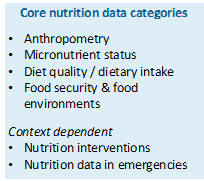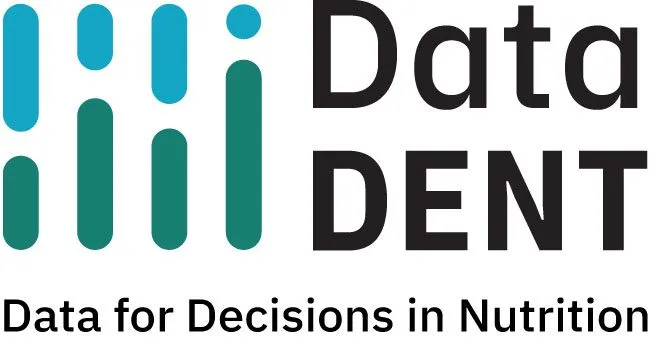We previously reported hearing the following question from our national partners: How do we strengthen capacity to use nutrition data? To help answer this question, DataDENT is taking a critical look at the knowledge and skills underpinning this capacity at the national level. We are asking stakeholders from across nutrition: What knowledge and skills around nutrition data use are needed by the people who are planning, implementing and monitoring national food and nutrition policies and programs?
Typically, we think about the knowledge and skills being closely tied to the individual people working on nutrition policies and programs: This person has a deep understanding of data on stunting; that person has extensive experience creating visualizations of routine administrative data.
While a specific individual’s knowledge and skills are vitally important, it is equally important to consider the aggregate knowledge and skills across the national nutrition information system (NIS).

Taking a systems approach to assessing the capacity to use nutrition data will help identify what and where capacity tends to exist as well as what and where new or additional capacity is often needed. Taking a systems approach also considers how capacity – or lack of capacity – in one part of a national NIS affects other parts of the system.
A systems approach will also provide clarity on how different knowledge and skills are applied for specific data-use tasks and how often the capacity is required. For example, many people working in nutrition need the capacity to interpret routine administrative data about the reach or coverage of nutrition interventions. Conversely, the highly specialized knowledge and skills for the collection and analysis of micronutrient status data is only needed by the small number of people involved in carrying out surveys every 5+ years.
The nutrition data value chain (DVC), which is a central component of DataDENT’s work, is essentially a systems approach to nutrition data. The six nodes in the DVC – prioritization; creation & collection; curation; analysis; translation & dissemination; and decision-making – will also be used to identify key knowledge and skills relevant to nutrition data use.
The nodes for prioritization and creation & collection are particularly relevant because issues such as poorly selected/defined indicators and missing/low-quality data impact every aspect of data use. When thinking about how to strengthen the capacity for data use in these two areas, there are a few fundamental questions that will be considered:
Prioritization
- What knowledge is needed to identify specific indicators most relevant to a country’s key nutrition outcomes?
- What knowledge is needed to prioritize key data and indicators in a country’s nutrition plans and frameworks?
Creation & collection
- What types of data are most critical to understanding and improving national nutrition policies and programs?
- What knowledge and skills about how priority data are collected do different types of data users need? (E.g., Approaches, tools, technologies, frequency, quality controls, strengths/weaknesses, etc.)
- How well do different users need to understand the data that are collected? (I.e., not all data users need the same level of understanding.)
DataDENT is currently reaching out to stakeholders at national and global levels to get their thoughts on issues related to the capacity to improve nutrition data use. We want to know what issues matter the most at country-level and where to target efforts to strengthen the capacity to use data. Targeted is an important consideration in this context. We believe capacity strengthening should focus on the issues that are a priority in the country’s nutrition policies and programs. It should focus on the knowledge and skills related to data use that would benefit most from improvement. It should focus on the people who will make the most effective use of improved knowledge and skills.
While there is no single answer to the question How do we strengthen capacity to use data? – we believe thoughtful input from stakeholders is an important next step towards identifying some of the essential knowledge and skills. From there, we can explore ways to design and implement targeted initiatives to strengthen the capacity of individuals and systems to use data.
What do you think are the essential knowledge and skills supporting effective use of nutrition data? Leave a comment or reach out to us on LinkedIn & X.
